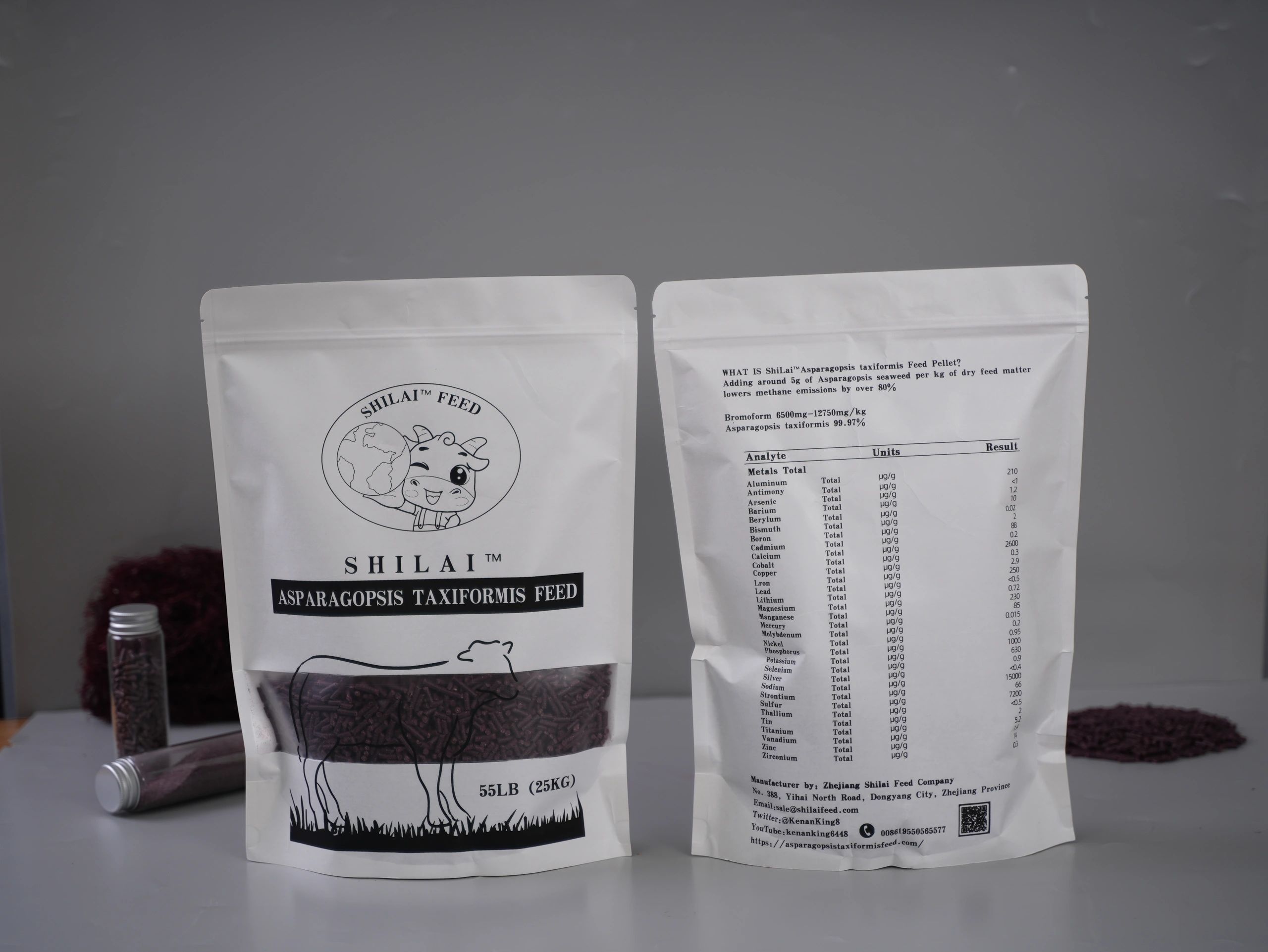Additive ready Asparagopsis taxiformis concentrate for feed blending

Global food production systems generate a considerable amount of greenhouse gases, chiefly from livestock rearing.
Due to its much greater warming potential relative to carbon dioxide, methane emissions are a high-priority target for mitigation.
Scientists are exploring the use of Asparagopsis taxiformis, a red algae species, as a novel approach to mitigate livestock methane.
A unique chemical in the seaweed interferes with rumen methanogens, resulting in measurable decreases in methane production.
Including Asparagopsis taxiformis in livestock formulations has returned positive early-stage evidence for cutting methane from ruminant animals.
- In addition to methane cuts, Asparagopsis taxiformis brings several beneficial side effects for farm operations.
- Greater nutrient uptake and robustness
- Chance to build circular supply chains around seaweed production
Continued study and commercial testing are required, however Asparagopsis taxiformis could be a transformative sustainable solution.
Harnessing Asparagopsis taxiformis Powder as an Innovative Feed Additive
The powder and extract forms of Asparagopsis taxiformis could deliver new nutritional and environmental value in feeds.
The seaweed offers a combination of nutritive and bioactive properties that benefit animal performance.
Blending A. taxiformis powder into rations has produced measurable methane cuts in research and supplies supportive nutrients.
Continued scientific trials are needed to calibrate doses, processing techniques, and longitudinal effects on livestock.
The Role of Asparagopsis taxiformis in Shaping Sustainable Animal Farming

Asparagopsis taxiformis is drawing recognition for its ability to help resolve the environmental impacts of standard animal farming.
Adoption of the algae in feed could enable measurable reductions in methane and a smaller ecological footprint for farms.
Research suggests the seaweed can additionally support better animal health and production performance under certain conditions.
More work to verify long-term safety and logistical viability is necessary, though early findings look promising.
Asparagopsis-Based Feed Supplements for Methane Cuts
Scientists identify Asparagopsis as a credible method to reduce methane generation within the rumen of ruminants.
The mechanism involves the seaweed’s compounds blocking or inhibiting the microbes that produce methane in the rumen.
- Published experiments indicate that Asparagopsis supplementation can substantially lower methane emissions in ruminants.
- The use of Asparagopsis as a feed additive is considered an environmentally sustainable approach to methane mitigation.
- Agricultural stakeholders are evaluating the practical adoption of Asparagopsis within farm feed programs.
Asparagopsis: A Seaweed Changing the Landscape of Livestock Farming
Asparagopsis taxiformis represents a marine solution that could help transform how methane is managed in livestock systems.
- Research trials show that diet inclusion of Asparagopsis leads to significant methane declines and consequential emissions benefits.
- This advancement could support sustainable food systems by reducing emissions without compromising animal nutrition.
As climate strategies evolve, Asparagopsis emerges as a distinctive, implementable solution for cutting livestock methane.
Optimizing Feed Formulations with Asparagopsis taxiformis for Greater Methane Cuts
Scientists are evaluating processing and formulation variables to boost the practical efficacy of A. taxiformis in diets.
The Science Behind Asparagopsis taxiformis's Methane-Lowering Effects
Scientists attribute the effect to Asparagopsis compounds that impair the methanogenesis process in the rumen.
A key active molecule, bromoform, is implicated in inhibiting methanogenesis, though research continues into alternatives and safety profiles.
Formulating Feeds with Asparagopsis to Support Sustainable Agriculture
A. taxiformis can be formulated into feeds to deliver both nutritional benefits and methane reduction properties.
Asparagopsis integration may improve nutrient density, digestive efficiency, and deliver ancillary antimicrobial or immunomodulatory effects.
Leveraging Asparagopsis taxiformis for Environmental Gains in Food Production
Asparagopsis taxiformis could play a role in reshaping food systems by reducing emissions and enhancing environmental performance.
- Additionally, the species offers a useful blend of nutrients that complement feed formulations.
- Scientists and industry experts are actively exploring its uses across aquaculture, agriculture, and food production sectors.
Bringing Asparagopsis into routine practices has the potential to reduce emissions associated with animal production.
Asparagopsis Feed Strategies to Improve Animal Well-Being and Productivity
The algae’s profile suggests it could function as a feed supplement that improves both sustainability and livestock outcomes.
Studies report improvements in nutrient uptake and feed efficiency when Asparagopsis is integrated into rations, aiding growth.
The seaweed’s bioactives may provide antioxidant and immune-support effects that support animal robustness and disease resistance.
As markets prioritize sustainability, Asparagopsis is emerging as an attractive solution pending further research and industry rollout.
Towards Carbon Neutrality with Asparagopsis-Enhanced Feed Solutions
As the agricultural sector seeks pathways to emissions reduction, Asparagopsis stands out as an implementable methane mitigation measure.
- Experts propose that active compounds in the algae block key microbial pathways that produce methane in the rumen.
- Controlled experiments have shown that feeding Asparagopsis can yield notable declines in methane production.
Beyond being a lower-emission feed choice, the approach could help reorient food production to align with climate resilience goals.